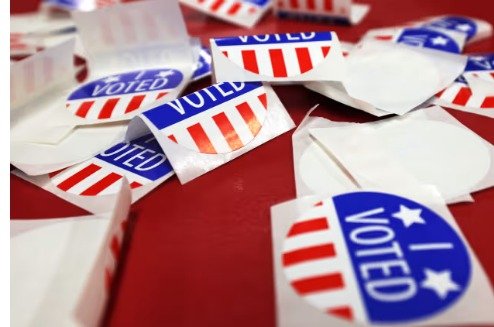
Paul R. La Monica
May 9, 2024
Election Day in the U.S. is about six months away. Before voters head to the polls to cast their ballots, investors need to start thinking about how the highly contested presidential race — and the possibility of a divided Senate and House of Representatives — will impact their portfolios.
The broader market, despite some April hiccups, has enjoyed a solid rally so far in 2024. But equity strategists at J.P. Morgan Securities said in a report Tuesday that there could be a lot more volatility ahead as the presumed rematch between President Joe Biden and former President Donald Trump heads into high gear.
“We see U.S. elections as one of several underappreciated policy risks in the second half of this year,” the strategists said in the report.
With that in mind, they came up with several lists of stocks that could be affected by various election outcomes this fall.

Election Day falls on Nov. 5, 2024, this year. MICHAEL M. SANTIAGO/GETTY IMAGES
A Trump win would probably lead to more protectionism, the analysts predict, which could be bad for large U.S. companies that rely on imported goods, including General Motors (GM 0.59%), Hasbro (HAS -0.43%), Mattel (MAT 0.93%), Nike (NKE -0.11%), and Walmart (WMT 0.54%). But it might be good for oil companies that could gain from reforms aimed toward boosting domestic drilling permits. That could also be a boost for Baker Hughes, Exxon Mobil, and ConocoPhillips.
If Biden were to be re-elected, J.P. Morgan thinks U.S. semiconductor companies benefiting from the Chips Act, which provides funding for more semiconductor production in America, could get a lift. They highlighted Applied Materials, Texas Instruments, and Intel as potential winners. A second term for Biden may also lead to more eco-friendly initiatives—which could be good news for generator maker Generac, solar power firm Sunrun, and electric-vehicle charging network EVgo.
But regardless of who wins the White House, economic conditions between the U.S. and China will likely remain tense.
“It is worth highlighting that both candidates continue to be hawkish on China without a clear path back to normalized pre-U.S./China trade war relations,” the strategists said. With that in mind, they added that companies with at least 15% of their sales from China, including Apple, Nvidia, Tesla, Agilent, and Broadcom, could be negatively impacted.
Still, some on Wall Street argue that investors shouldn’t make too many assumptions about what will happen after November. Even though Biden and Trump are both known commodities for investors, the market has gotten a lot of things wrong about how prior elections might impact certain stocks and sectors.
“Coming into 2017, there were expectations of a strong pro-Energy agenda by the Republican administration across permitting reform, drilling on federal lands, etc.,” the JPM strategists said. But energy stocks ultimately tumbled 30% by the end of Trump’s first term in early 2021. The Covid pandemic was part of the reason, with stocks broadly plunging in early and mid-2020. But according to J.P. Morgan, the lesson is that “other macro/idiosyncratic drivers still have large roles to play where policy is one of many inputs.”
Along those lines, analysts at Morningstar also noted in a recent report that while Trump has often been critical of Big Tech and social-media firms and Biden has been a bigger fan of alternative energy over oil, “counterintuitively, technology ended up as the best-performing equity sector under Trump, and energy stocks have done best under Biden.”
There are other factors at play in Washington, too. “A U.S. president doesn’t implement policy by fiat. Congress owns taxing and spending authority, while the Federal Reserve is an independent institution that oversees monetary policy,” the Morningstar analysts added.
The bottom line? Investors can only prepare so much for uncertain political outcomes. It’s hard enough to predict what the economy, the Federal Reserve’s interest rate policy, and corporate earnings will look like in a few months—let alone who will win a presidential race that’s increasingly looking like a tossup.
One fund manager added that there’s a lot less mystery than there was when Trump first ran in 2016. “Obviously the election takes up a lot of oxygen but from a market perspective it couldn’t be more steady having an incumbent running against his predecessor,” said Lamar Villere, partner and portfolio manager with Villere & Co.
“Investors have seen them both and they are known quantities. The election is not going to have any big impact on how we manage our portfolio,” he added.
In other words, don’t get too caught up in the noise from Washington.
“Earnings and cash flows are ultimately bigger drivers of markets than politics,” the Morningstar analysts concluded.
This Barron's article was legally licensed by AdvisorStream.
MICHAEL M. SANTIAGO/GETTY IMAGES



